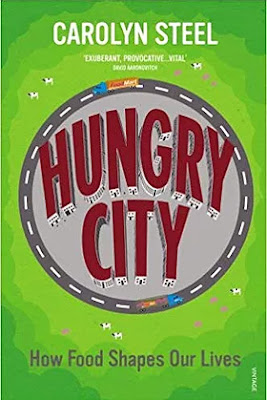How do you feed a city? It’s a question that we rarely ask, but which lies at the core of civilisation. The feeding of cities arguably has a greater social and physical impact on us and our planet than anything else we do. Yet few of us living in modern cities are conscious of the process. Food arrives on our plates as if by magic, and we rarely stop to wonder how it might have got there.
When you think that every day for a city the size of London, enough
food for thirty million meals must be produced, imported, sold, cooked, eaten
and disposed of, and that something similar must happen every day for every
city on earth, it’s remarkable that cities get fed at all. Food shapes cities,
and through them, it moulds us – along with the countryside and oceans that
feeds us. Every day we inhabit spaces made by food, unconsciously repeating
actions that are as old as cities themselves. We might assume that takeaways
are a modern phenomenon, yet 5,000 years ago, they lined the streets of Ur, one
of the oldest cities on earth. Markets and shops, pubs and cafés, kitchens and
waste-dumps have always formed the backdrop of urban life.
Hungry City follows food’s journey from land and sea to the city,
as it travels by ship, plane, road and rail through markets and supermarkets to
kitchen and table, waste-dump and back again, to show how this endless cycle
affects our lives and impacts on the planet. The final chapter, Sitopia, asks
how we might use food to re-think cities in the future – to design them and
their hinterlands better, and live in them better too.
"Hungry City is a smorgasbord of a book: dip into it and you
will emerge with something fascinating"
Independent
"Hungry City is a sinister real-life sequel to Animal Farm
with the plot turned upside down by time in ways even George Orwell could not
have foreseen"
Observer
"Exuberant, provocative... her desire that we understand
better and think more about our food, how much we waste, how much energy it
consumes and how we dispose of it is - in the real sense of the word -
vital"
David Aaronovitch, The Times
https://www.carolynsteel.com/hungrycitybook

No hay comentarios:
Publicar un comentario